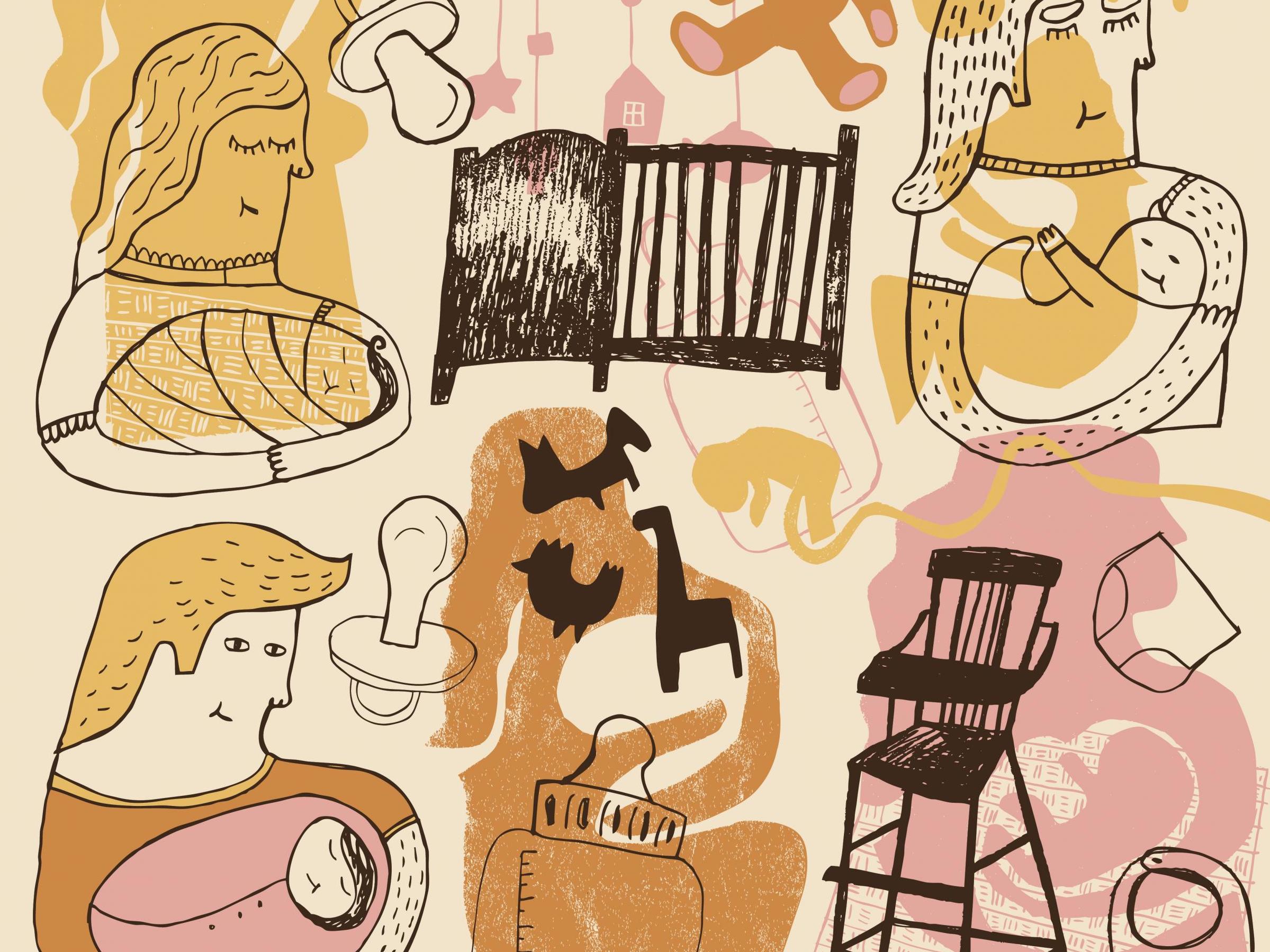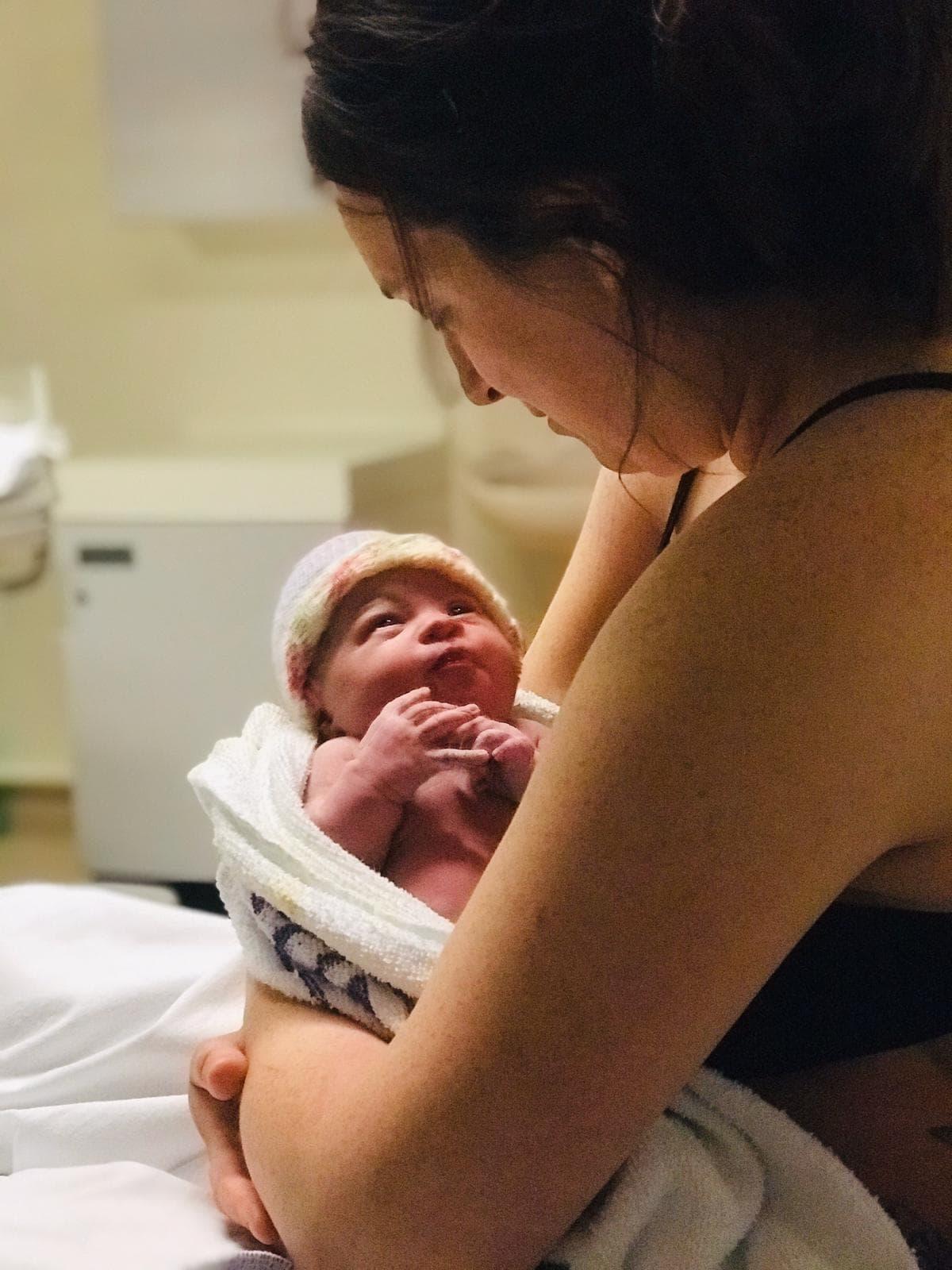‘We’ve lost memories we dreamed we’d have’: How it feels giving birth in lockdown
As the Prime Minister and his fiance celebrate the arrival of their new baby, Sophie Gallagher speaks to parents across the UK about how coronavirus and lockdown changes giving birth


Your support helps us to tell the story
From reproductive rights to climate change to Big Tech, The Independent is on the ground when the story is developing. Whether it's investigating the financials of Elon Musk's pro-Trump PAC or producing our latest documentary, 'The A Word', which shines a light on the American women fighting for reproductive rights, we know how important it is to parse out the facts from the messaging.
At such a critical moment in US history, we need reporters on the ground. Your donation allows us to keep sending journalists to speak to both sides of the story.
The Independent is trusted by Americans across the entire political spectrum. And unlike many other quality news outlets, we choose not to lock Americans out of our reporting and analysis with paywalls. We believe quality journalism should be available to everyone, paid for by those who can afford it.
Your support makes all the difference.It was 7am on a Sunday morning and pregnant Sian Lewis was standing on the pavement with a suitcase waving goodbye to her husband Geraint and two sons as they drove away, leaving her alone at the Wrexham Maelor hospital in north Wales. This wasn’t how the 38-year-old had imagined the birth of their third child – having to be induced early or going in without her birthing partner who was now only allowed to be present once active labour had begun.
None of it was how she had pictured: the five weeks the family spent in isolation prior to the birth; being told the baby had stopped growing on 17 April (three weeks before the due date) and needed to be delivered urgently; or wearing personal protective equipment (PPE) she had at home from her work as a health visitor because she was so scared of catching coronavirus, which had killed 16,060 people in the UK by 19 April, the date she went to be induced. “It was horrific,” she tells The Independent. “I didn’t know if I was going to come out, I thought I’d catch Covid-19 and never see my boys again”.
Things didn’t get any better inside the hospital: Sian started haemorrhaging blood and her waters were broken by doctors all wearing full PPE – “it felt like that scene in ET” – but fortunately Geraint was able to get back in time to see their son Wilfred be born at 2.35am on Monday morning. Although he was only allowed to stay for a couple of hours. “The midwife apologised to me and said ‘I’m sorry, I just want to hug you’,” she recalls.
Since the start of the coronavirus outbreak in the UK, the NHS has had to adapt to the biggest medical crisis in its 72-year history. Few departments have been left untouched by changes including staff redeployment, wearing PPE when treating patients, encouraging social distancing of two metres on wards and changing rules about visitors. Sophie King, a midwife at Tommy’s charity, says for most maternity units the most visible change has been to birthing partner policies.
“Most are now only allowing one asymptomatic birth partner to be there for the labour,” says King. “Once the baby is born, mum and baby are transferred to the postnatal ward and the birth partner needs to leave. If a planned caesarean is taking place, again one birth partner will be allowed to be present for the birth only.” A BBC investigation, which asked NHS trusts about current services, found that (of those which responded) all but one trust in London are allowing just one person to be present during labour and that 75 per cent are sending that person home post-birth.
For first-time mum Lorraine Coram this was a particular concern. The 39-year-old was admitted alone to the Queen Alexandra hospital in Portsmouth on 23 March, the night Boris Johnson told the nation it was entering lockdown. After waiting 11 years and having two miscarriages, Lorraine was now terrified the rules would change and cause husband Martyn to miss the birth of their first child. “I was admitted on Monday night [before labour started] so he wasn’t allowed in. That was pretty scary, as I didn’t know what to expect,” she says. Fortunately he made it just in time to see Atticus Morse Coram born at 8.03am.
After the birth Martyn was sent home. “Atticus and I stayed a night so Martyn had to leave us as soon as we left the birthing suite, and didn’t see us until we were discharged, nearly 24 hours later,” says Lorraine. For others the time spent away from their baby has been much longer. Joanna Lloyd-Adams, 30, and newborn baby Gracie, didn’t see husband Grant, 30, for four days after the birth on 14 April. Gracie, the couple’s third child, was kept in because of her low body temperature, which needed to be monitored. “Grant held her a couple of times when she was newborn but then didn’t see her again till she was four days old because he wasn’t allowed back. Gracie’s two brothers [Oscar, 4 and Henry, 2] didn’t get to meet her until then either.”
Although, like both Sian and Lorriane, Joanna says she couldn’t fault the midwives, who were trying to be as compassionate as possible to the family in exceptional circumstances. “On day three of being in hospital I had a bit of a breakdown and they were so lovely. One said to me: ‘I won’t sugar coat it, it is a rubbish time to have a baby’.”
Midwife Sophie King says: “We understand this current outbreak has caused a lot of anxiety, and we all wish that it didn’t have to be this way in maternity units. But in our current climate, we are all having to undertake less than ideal changes to our day to day lives. As soon as we are safe, these measures shall start to be stepped down in accordance with government plans.”

Another impact the coronavirus has had on maternity services is some midwives wearing PPE. Joanna says it was strange to not be able to properly see the faces of those around her bed. “She wasn’t wearing it the whole time, just before the baby arrived they got dressed up. The first photo we have of Gracie being weighed by the midwife, she is all in PPE. It was strange initially, although as I stayed in hospital longer it became normal. The poor staff said wearing it made things like taking blood difficult to do.”
Cherie Lawrence, 25, from Nottingham, whose baby Kobie was born on 4 April, said the thing she noticed most was the different atmosphere to when she had her daughter Lavaeh-Rose. “The hallways were empty, it was silent,” she says. “We were isolated in a private room which we weren’t allowed to leave. We had to plead with the nurses to let my husband go to the pharmacy downstairs and buy lip balm, as the gas and air makes all your lips crack. The midwives had to bring us coffee and drinks too.”
“It felt like no one was excited about having a baby,” agrees Dr Janine Simpson, 32, who had baby Erin on 18 March at the Princess Royal in Glasgow. “Maternity wards are normally a lovely place to be but it felt sombre.” On the plus side, the empty wards meant Cherie was given an epidural instantly because there were plenty of anaesthetists on hand. “And the parking was free, that saved us a fortune,” she jokes.
It’s scary to think we’ve just been left to do it on our own...”
The changes don’t finish once mum and baby leave hospital. Normally care is transitioned from a midwife to a health visitor who will visit in the first two weeks. On day five to eight parents are also offered two screening tests (newborn hearing and heel prick) as well as support on issues like breastfeeding. But since the coronavirus outbreak many trusts in England are no longer sending health visitors out to families, instead asking parents to come to a GP hub. Others have been left to their own devices. For Lorraine, this is a concern. “[Atticus] has not been seen since he was 10 days old, now he is five weeks. It’s scary to think we’ve just been left to do it on our own.”
Meanwhile health visits are still happening in some parts of Scotland but they are visiting with extra precautions. “The health visitor comes in full PPE, visors and aprons,” says Janine. “She puts the scales on the front door step and then I weigh the baby and have to clean the scales and pass them back.”
Other newborn moments like registering the birth are also on hold as registry offices across the country are closed. Lauren Hayhurst, 36, from Plymouth but currently living with her parents in Gloucestershire after the birth of daughter Alicia, says not doing those things has been “surreal”. “As a first-time mum you want validation that you’re doing things right, you want to walk out in the world with the pram, you want that birth certificate. It’s almost like she doesn’t exist yet.”
For Lorraine, being unable to get the professional newborn photographs they had wished for, after 11 years of waiting for a baby, was difficult. “I’m so sad, our photographer talked us through how to take a newborn photo, but it’s not the same and it’s not something we can ever recreate. It’s like we’ve lost memories we dreamed we’d get to have.”
Newborns don’t stay newborn for very long and this lockdown is going on so it’s a good chunk of the baby’s first year...”
The absence of extended family is also a point of difficulty for almost all the parents we spoke to – for emotional reasons and for more logistical ones too. Lorraine says: “We’ve all waited so long for Atticus to be here it feels super sad that we can't share him in real life with everyone.” Many have been relying on video calling to try and connect but the lack of physical touch is testing.
Some parents have had family come to the house and look through the window, but it isn’t the same. Joanna, whose mum and dad did that, says: “Newborns don’t stay newborn for very long and this lockdown is going on so it’s a good chunk of the baby’s first year”.
Other couples have struggled without family as a source of childcare. Adam and Laura Tollerfield, 32 and 31, from Castleford in West Yorkshire had to break lockdown and take their two-year-old son Jacob to stay at his grandma’s house when Laura went into labour. “We didn’t like doing it,” says Adam, “but we had no other choice”. Seana Duggan, 33, from Bath, had to leave her three-year-old child with her neighbours when she went to deliver baby Finn Duggan on 2 April, after her own parents got stuck in Ireland, unable to travel. “This was a huge source of stress for me as I had to consider the possibility of delivering the baby without my husband if he had to stay with our daughter. Alternatively, I imagine our daughter feeling abandoned.”
Despite the struggles, some parents admit there have been unexpected benefits to the unusual circumstances, like being able to spend more time together than maternity or paternity leave would have allowed. Lorriane says: “My husband does get to be here all the time, and not many new dads can say they’ll have this much bonding time.” Sian agrees: “Despite everything, we are in our little family bubble now, with no pressure to tidy the house for visitors or get ready. And I’ll always be able to tell Wilfred he was a special lockdown baby.”
On average there are 250 babies born every minute around the world, and more than 700,000 each year in the UK. As we approach the 40th day of the UK lockdown thousands of babies will already have been born – including the prime minister’s own son who was delivered on 29 April – with many more to come. While new rules make it ever harder for parents, they will never forget their child was part of a unique period in our nation’s history.
Join our commenting forum
Join thought-provoking conversations, follow other Independent readers and see their replies
Comments